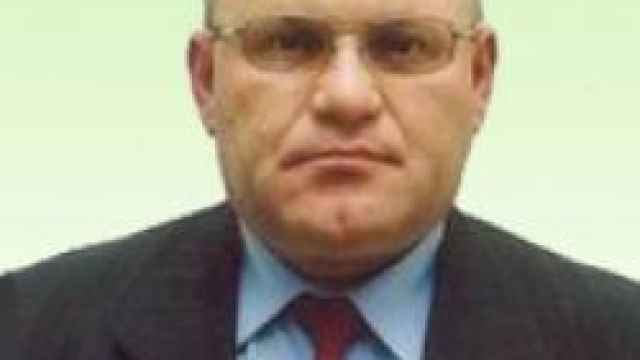
Magomedov
President Dmitry Medvedev on Monday nominated four candidates to replace incumbent regional leaders, including the son of Dagestan's long-serving former president, raising questions about his plan to refresh the regional leadership with new faces.
The nominations follow last month's decision by long-serving Tatarstan President Mintimer Shaimiyev to request that he not be considered for a fifth term when his current one expires in March. The move was seen as a graceful exit for the popular Shaimiyev, making it harder for other third- and fourth-term governors to seek reappointment.
Last month, Medvedev suggested limiting regional bosses to three terms after recommending the scandal-tainted Primorye governor, Sergei Darkin, to remain for a third term.
The Kremlin press service said Monday that Medvedev nominated local lawmaker Magomedsalam Magomedov, 45, to lead the volatile Dagestan republic.
He also tapped Lev Kuznetsov, a 44-year-old former executive at Norilsk Nickel, to become governor of the Krasnoyarsk region. Kuznetsov would replace former Norilsk CEO Alexander Khloponin, whom Medvedev promoted last month to head the newly created North Caucasus Federal District.

Kuznetsov
United Russia State Duma Deputy Natalya Komarova, 54, was tapped to take over the oil-rich Khanty-Mansiisk autonomous district, which has been led by Alexander Filipenko, 59, since 1991. If confirmed by the regional parliament, she would become the second Russian female governor, after St. Petersburg's Valentina Matviyenko.
Medvedev offered 54-year-old Alexander Vinnikov, mayor of Birobidzhan, capital of the Jewish autonomous region, to head the far eastern region. The incumbent governor, Nikolai Volkov, 58, has also held the post since 1991.
A source in the presidential administration told Interfax on Monday that the "president has shaped a course to refresh the governors' corps," and the nominations largely reflected that trend. They also showed the Kremlin turning back to local hires after a regional outsider — Kaliningrad Governor Georgy Boos — was caught unawares by a massive protest in his region late last month.
Tatarstan's Shaimiyev will be replaced by a political ally, the republic's prime minister.
Of all the nominations Monday, the choice of Magomedov for Dagestan was the most intriguing.
The deadline for Kremlin proposals passed more than two weeks ago, and United Russia proposed a record five candidates for Medvedev. Adding to the stakes, political violence — a routine element of life in Dagestan — has been escalating in recent months.
On Friday, Akhmed Magomedov, police chief of the capital Makhachkala, was shot dead along with a driver and two bodyguards. He is not related to Magomedsalam Magomedov.

Komarova
But Medvedev's candidate is the son of Magomedali Magomedov, who ruled Dagestan from 1991 to 2005, suggesting that the Kremlin will stay pragmatic while seeking to bring new blood into the aging corps of governors.
The elder Magomedov, now 80, managed his political longevity thanks to a talent for balancing the appetites of the numerous and violent clans that comprise the Dagestani ruling elite. He resigned abruptly after a secret meeting with then-President Vladimir Putin.
Mukhu Aliyev, who led Dagestan during the late Communist era and became speaker of the republic's parliament under Magomedov, was then nominated to become president and approved by the local parliament.
Lawmakers then also voted unanimously to install Magomedsalam Magomedov, a wealthy businessman, as its new speaker. After the regional parliamentary elections in 2007, the new Dagestani parliament unanimously voted to replace Magomedov as speaker, although he stayed on as a lawmaker from United Russia.
Curiously, the senior members of the Dagestani parliament have promised to vote unanimously for any candidate proposed by Medvedev. All of the Kremlin's gubernatorial nominations have been approved by local legislatures since the system replaced direct elections in 2005.
Aliyev is an ethnic Avar, which is the biggest — though politically divided — ethnic group in Dagestan. The Magomedovs belong to the second-largest group, the Dargins. Avars and Dargins traditionally compete for power in the republic, which has dozens of distinct ethnic groups.

Vinnikov
Aliyev was among the five candidates pitched to Medvedev by United Russia.
In 2005, political pundits described the appointment of Aliyev — a soft-spoken, well-educated bureaucrat without a powerbase of his own or a history of involvement in corruption — as an exception to the rule in Dagestani politics. It was also seen as a sign that the Kremlin wanted to undercut the republic's clannish, corrupt and violent nature.
But the attempt has made little progress. Dagestan still features prominently in the criminal news, and there have been no signs of a local economic recovery, despite billions of rubles in aid from the federal government.
"Just a year after [Aliyev] was appointed, all the clans were back in the game, dividing money and cushy positions in the government, and he was fine with it," a senior official in the Dagestani government said Monday by phone from Makhachkala. He spoke on condition of anonymity, fearing retribution from Aliyev's supporters.
The Kremlin's choice of Magomedov might mean that Moscow has opted for a policy of pacifying the republic by seeking balance among the warring factions rather than a violent confrontation with them, the official said.
"And, of course, Magomedov will strongly rely on the authority of his father," the official said. The elder Magomedov still actively participates in Dagestani politics as the honorary chairman of the State Council, a consultative body representing the 14 so-called titular ethnic groups there.
Alexei Titkov, a regional analyst with the Higher School of Economics, agreed.
"Aliyev was selected five years ago in hopes of change for the better. Magomedov's selection is an attempt to mothball negative developments in Dagestan," he said.
A Message from The Moscow Times:
Dear readers,
We are facing unprecedented challenges. Russia's Prosecutor General's Office has designated The Moscow Times as an "undesirable" organization, criminalizing our work and putting our staff at risk of prosecution. This follows our earlier unjust labeling as a "foreign agent."
These actions are direct attempts to silence independent journalism in Russia. The authorities claim our work "discredits the decisions of the Russian leadership." We see things differently: we strive to provide accurate, unbiased reporting on Russia.
We, the journalists of The Moscow Times, refuse to be silenced. But to continue our work, we need your help.
Your support, no matter how small, makes a world of difference. If you can, please support us monthly starting from just $2. It's quick to set up, and every contribution makes a significant impact.
By supporting The Moscow Times, you're defending open, independent journalism in the face of repression. Thank you for standing with us.
Remind me later.

